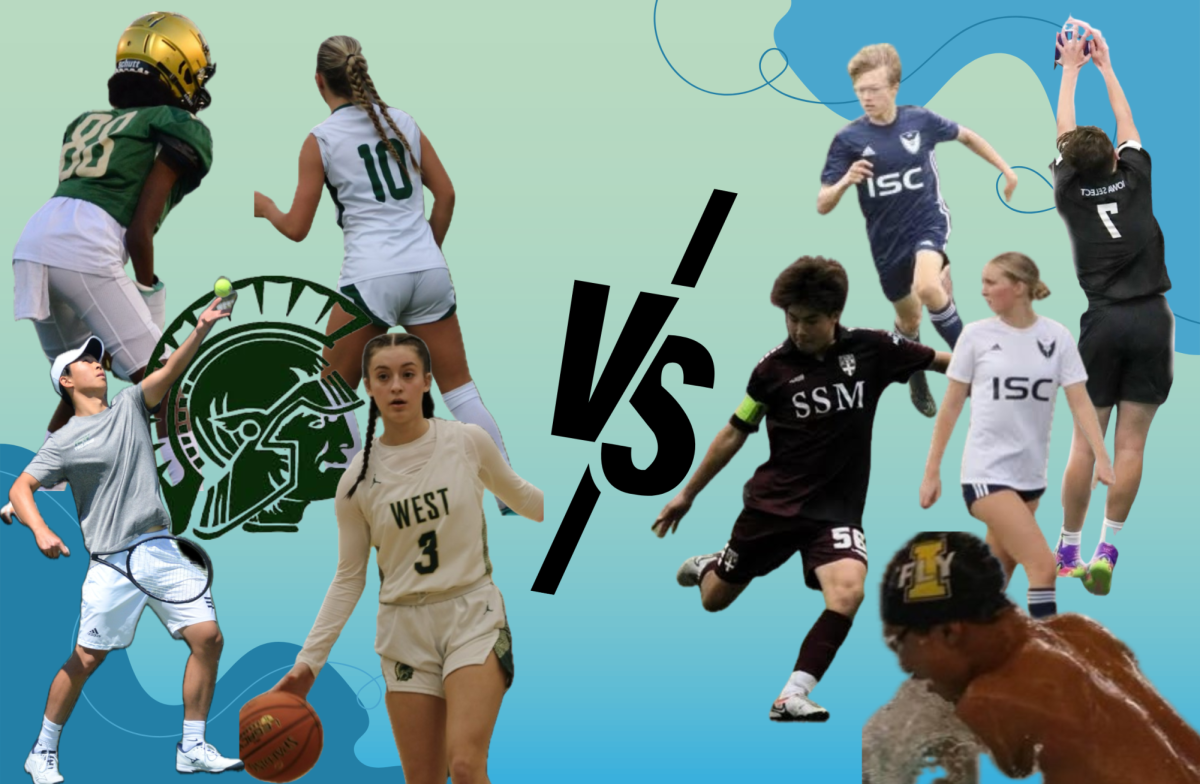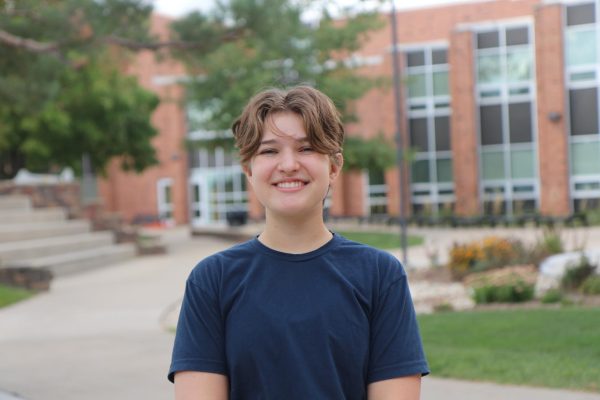West High athletes sometimes choose to play club sports to further their athletic ability and get off-season playing time, while others decide not to. Club sports have their benefits: they provide extra experience and also can provide the opportunity to play sports athletes may not be able to otherwise. While they do have many benefits, they have two main drawbacks: they are often expensive and are time-consuming.
Continue reading to learn about different athletes’ experiences playing or not playing club sports in high school.
Emelia Grueter ’26
Emelia Grueter ’26 has been swimming for Iowa Flyers Swim Club, a club swimming team operated by the University of Iowa Recreational Services, since the age of eight. The time and energy she’s put into her sport has paid off, she now is a varsity swimmer for the Trojan Bolts.
IFLY takes up a lot of her time; Grueter said IFLY swimmers are expected to attend six to eight practices a week out of the ten offered. In the offseason, she usually finds herself lifting twice a week and attending four to six practices. It’s similar in-season as well, leading her to have to balance swimming and other aspects of her life.

Even though it’s time-consuming, Grueter finds being in season to be easier than out of season.
“There’s just that structure…I have to wake up at 5 a.m. I have to go swim practice. I have to go to school. I have to go to swim practice and then I have to eat sleep those things. So it really makes you prioritize your time,” she said.
Grueter swims year-round, with the exception of track season. Even though she doesn’t think it helps her with the season, she finds the time off vital for her mental health.
“I think physically, it makes me worse at swimming just or at least for a little bit just because you’re not doing it. But I’ve noticed I’m able to get back into the swing and growth because I have somewhere to go back and get used to it again. But I think mentally getting to take a three month break is necessary for me,” she said.
Grueter’s involvement in club sports has significantly impacted her athletic career and personal development. Her commitment to IFLY has allowed her to gain a spot on varsity for the Trojan Bolts. Illustrating the benefits of off-season training and specialized coaching. The structure and discipline required by club sports have taught her valuable life skills in time management and prioritization. However, her intense schedule also highlights the importance of balance.
Elle Barnett ’25
Some play sports at West, occasionally even on varsity teams, and choose not to play club as well. Elle Barnett ’25 decided to stop playing club volleyball after making the move to Iowa City a few years ago, around when the COVID-19 pandemic started.
Barnett started playing volleyball in seventh grade when she joined her middle school team; now, she plays on the West High varsity team. Additionally, she has been playing basketball since second grade and continues to excel on West’s varsity basketball team. When she decided to play club volleyball, she ended up having a very positive experience.
“I really enjoyed it. Like I made a lot of good relationships with people. That’s like my whole summer was just going to tournaments. and stuff. It was time consuming, but I didn’t really have anything else to do,” she said.
It was the community and coaching aspect that helped contribute to her overall positive experience.
“I’ve had great coaches. I really love all my coaches and my teammates. I feel like not only on the court have I had like really good experiences,” Barnett said.
After COVID and moving, she decided to take a break from club sports.
“We moved here, and that just was a little overwhelming at first. I knew I was going to take a year off…I was like, I really want to do a lot of other stuff. Like I wanted to get a job, experience that; I want to babysit. I was thinking about college,” she said.
Deciding not to play club sports has affected how Barnett plays as a part of West High athletics. She and other athletes have noticed the pressure to play club sports, even while playing for the school. Because she doesn’t have the same kind of off-season practice other athletes in her sports do, this has affected her ability to pursue a professional career. However, she’s taken other measures to improve her skills out of season.
Barnett does personal training every week and tries to improve her skills independently. She sees a personal volleyball trainer in Tiffin, Iowa, with her friend Maeve Christians ’25. She also goes to open gyms and maintains her physicality by working out. It’s still hard work, even if it’s not the same commitment as a club team.
Her thought process about variety in her activities still exists today.
“I just knew I wanted to do other stuff. I love it, but why would I do it [clubs] and spend the money if I’m not doing it [basketball] in college,” she said.
Barnett added later that her teammates bring back the skills they learned from playing club, which makes her an even better athlete as well during the school season.
Barnett’s experience has demonstrated that playing club sports isn’t the only path to success in high school athletics. Although the chance at a professional career has been lowered, her decision to step away from club volleyball and focus on other activities hasn’t prevented her from excelling on West’s varsity teams. Through personal training, self-improvement and maintaining a balanced approach to her interests, Barnett has shown that it’s possible to thrive in high school sports without the time and financial commitments of club sports.
Matt Cannon ’24
Club sports can also provide the opportunity to play other sports not offered at one’s school. Matt Cannon ’24 found a love for volleyball, a sport not offered for boys at West, around the age of 11.
“The first time I really found volleyball was when I used to go to the rec center with my dad and my sister and they would practice volleyball together and I would just go like play basketball. And one time I tried [volleyball], and I really liked it. And so I just kept going with it,” he said.
Cannon played at Prairie High School for two years until he was 13 and has been playing at Iowa Select Volleyball Club in Davenport, Iowa, ever since.
When asked why, he said he wasn’t entirely sure. “It’s kind of hard to say what drew me to it besides just like the aspect I think. I think partly because it’s just not as big in Iowa, the people who play it really want to play it so you find a lot of people who are really motivated.”
Since boys volleyball is also a less popular sport in Iowa, according to Cannon, there are around five teams in the state. He has gotten to play with a variety of different people. The people on his team are in high school but come from all over the state. He also occasionally plays with adults, including his dad’s friends.
The season usually lasts around half a year, from December to the end of June. This means Cannon gets a small break between when his season playing football ends and his volleyball season begins.
When asked if playing club volleyball has helped him get the opportunity to play in college, Cannon said he believes it has, but only to an extent, given that men’s volleyball isn’t very popular in Iowa.
“Because there’s a lot of colleges and since it’s not big they have to reach like way outside Iowa…they have had people from like foreign countries,” Cannon explained.
Despite men’s volleyball not being as popular in Iowa, it has its positives. Cannon explains that because it’s such a unique sport in the area, those who do play are incredibly passionate and committed, creating a supportive and dedicated environment.
Cannon’s journey into volleyball through club sports shows the unique opportunities they provide. Discovering his passion for volleyball, a sport not offered at high schools in Iowa, allowed him to pursue his interest through the Iowa Select Volleyball Club. Despite the limited popularity of men’s volleyball in Iowa, club sports offered Cannon the chance to play with a diverse group of individuals who shared his enthusiasm.
In the fall, Cannon will be attending St. Ambrose University in Davenport, Iowa, to play volleyball and major in chemistry.
Oscar Gates ’26
Oscar Gates ’26 has been playing soccer since he was five years old, and his participation in club sports ranging from Iowa Soccer Club in Iowa and Shattuck St. Mary’s in Minnesota has played a great role in his soccer career.
Gates lived in Iowa City until high school and used to attend Southeast Junior High. When high school came along, however, he decided to take his soccer career to a more professional level at Shattuck St. Mary’s, where athletes like Gates train all year long in their sport, along with taking classes for their schooling.
When asked how this club has helped improve his soccer career, Gates explained how it’s at a higher level, and he’s gained more knowledge through the game there. He also believes that it’s provided him with more opportunities, especially for college scouts.
Unlike other clubs, this school provides specific and individual help to its athletes so that they can excel in their athletic careers.
“We have professional trainers and lifting coaches, training on your own is easy, and you can do it anytime, we also play at a high level, and coaches here have sent many players to play in college and professionally,” Gates said.
Although being at this school has provided Oscar with more opportunities, he still needs to balance school work on top of extensive training. A typical day for Oscar involves going to school for a couple of hours and also attending training.
“I wake up go to school for four periods, then have soccer practice, then go back to school for two more periods, then lift after school, then go train again at night sometimes, then homework and go to bed,” he said.
Gates is grateful for his opportunity at this new school, as he has gotten to meet many new people from around the country. Sometimes, however, it can feel like there is a lot of pressure with all the competition.
Gates’s journey shows that club sports aren’t always the sole pathway to a professional career. While he only participates in high school soccer, his attendance at a specialized school for athletes provides him with the necessary training. This approach can be even more advantageous than club sports, as it integrates academics and athletics seamlessly. Now, one doesn’t have to balance school and club sports extensively.



